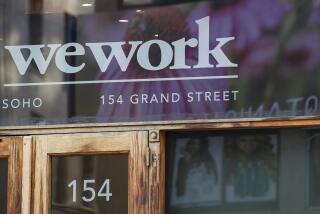Salomon Tries to Calm Fears as Confidence Slips : Brokerage: The scandal-plagued firm says the loss of several major clients will not cause a liquidity crisis.
- Share via
NEW YORK — Salomon Bros. worked to dispel fears of a cash crisis Thursday, as restive investors showed more signs of losing confidence in the scandal-tainted securities firm.
Salomon Bros.’ stock accelerated its slide, as the company’s common shares tumbled another $2.125, or 8.6%, to finish the day at $22.625. Salomon topped the New York Stock Exchange’s most active list as 5.77 million shares of the firm’s shares changed hands.
Salomon’s shares touched $37 a share in July as the firm, like many others in the securities industry, posted strong earnings for the first half of the year. Since the firm made its first public disclosure of wrongdoing on Aug. 9, the stock has fallen nearly 40%.
And in the commercial paper market, more investors are joining the state of California in refusing to roll over their short-term loans to Salomon when they come due. Only 15% to 20% of the $780 million in short-term loans to Salomon that will mature over the next two weeks has been renewed so far, company officials said.
Salomon officials said the actions do not presage a liquidity squeeze. They said the firm has about $8 billion in unpledged securities against which it can borrow, as well as extensive backup funding sources, to weather any storm.
“We are letting our commercial paper mature, and we are replacing it with repurchase agreements,” Donald S. Howard, chief financial officer of Salomon Bros. and its parent Salomon Inc., said in an interview. Commercial paper makes up just $6.5 billion of Salomon’s $120 billion in short-term financing, he added.
“We have no liquidity problem today, and we have no expectation of one in the future,” Howard added. “We have a contingency plan to ride this thing through, and it is playing out exactly as we anticipated it would.”
Salomon has admitted that it covertly bought more than the maximum allowable share of securities in Treasury auctions and made bids in the names of customers who hadn’t authorized them.
Salomon issued a public apology to London-based Mercury Asset Management on Wednesday for improperly using its name as Salomon made its illegal Treasury bids. The firm made the public apology to Mercury Asset Management after the British company publicly disclosed that Salomon had used its name.
Salomon also publicly apologized to the World Bank on Wednesday after the bank suspended all business dealings with Salomon at least through September. Although neither the bank nor Salomon would divulge the dollar value of their business dealings, the World Bank is a major client of the giant brokerage firm.
Also on Wednesday, California Treasurer Kathleen Brown said the state would no longer buy commercial paper from Salomon and would not renew the $230 million it already holds in short-term loans to the firm when they come due.
A day earlier, the California Public Employees Retirement System, the nation’s largest public pension fund, said it would suspend trading U.S. Treasury securities with embattled Salomon.
Salomon’s commercial paper is top-rated: Moody’s Investors Service rates it A-1 and Standard & Poor’s P-1. However, both rating agencies have placed Salomon’s securities on their watch lists because of the firm’s admission that it repeatedly violated bidding rules at Treasury note auctions.
The admissions triggered the resignations of Salomon’s three highest officials, including Chairman and Chief Executive John Gutfreund, and forced investor Warren E. Buffett to assume the interim chairmanship of the firm.
“A lot of the money market funds don’t want to hold paper on the credit watch list,” said Howard. “So we’re not pressing the market to renew.”
It was the refusal of commercial paper holders to roll over paper issued by Drexel Burnham Lambert that prompted the firm to seek protection from creditors under Chapter 11 of the U.S. Bankruptcy Code in February, 1990.
But analysts said Salomon is in no danger of suffering a similar fate. Drexel’s fall stemmed from its huge portfolio of junk bonds, which had fallen precipitously in value.
“Salomon is still a big, powerful firm,” said John Keefe, brokerage analyst at Lipper Analytical Securities Corp. in New York. “They may be forced to reduce the size of their inventories or to make some operational changes, but I don’t anticipate any significant funding squeeze.”
How Salomon Inc. Stock Has Fared
Price per share (in dollars)
Thursday close: 22.675
More to Read
Inside the business of entertainment
The Wide Shot brings you news, analysis and insights on everything from streaming wars to production — and what it all means for the future.
You may occasionally receive promotional content from the Los Angeles Times.










